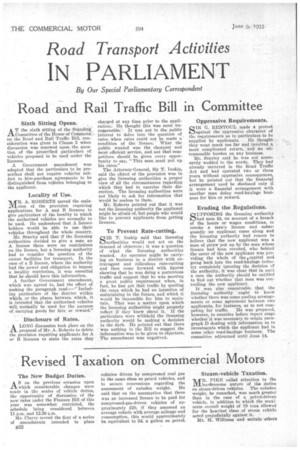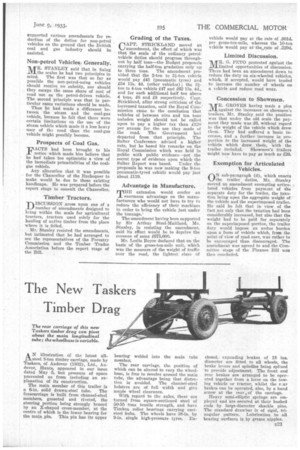Revised Taxation on Commercial Motors
Page 36

Page 37

If you've noticed an error in this article please click here to report it so we can fix it.
The New Budget Duties.
AS on the previous occasion upon which considerable changes were made in the scales of vehicle duties, the opportunity of discussion of the new rates under the Finance Bill of this year was somewhat restricted, the schedule being considered between 11 p.m. and 12,30 am.
Mr. Clarry moved the first of a series of amendments intended to place 1322
vehicles driven by compressed coal gas in the same class as petrol vehicles, and to secure concessions regarding the assessment of unladen weight. He said that on the assumption that there was an increased licence to be paid for compressed-gas-driven vehicles of approximately no, if they assumed an average vehicle with average mileage and consumption, this would approximately be equivalent to 3d. a gallon on petrol. Steam-vehicle Taxation.
MR. PIKE called attention to the burdensome nature of the duties on steam-driven vehicles. The unladen weight, he remarked, was much greater than in the case of a petrol-driven vehicle, hi addition to which the maximum overall weight of 19 tons allowed for the heaviest class of steam vehicle acted prejudicially against it.
Mr. H. Williams and certain others supported various amendments for reduction of the duties for non-petrol vehicles on the ground that the British coal and gas industry should be assisted.
Non-petrol Vehicles). Generally.
M& STANLEY said that in fixing the scales be bad two principles in mind. The first was that so far as possible the non-petrol-using vehicles should receive no subsidy, nor should they escape the same share of cost of road use as the petrol-driven vehicle, The second principle was that in particular cases variations should be made.
Thus he bad made a difference between the steam and the coal-gas vehicle, because he felt that there were certain limitations on the use of the steam vehicle which made it a less heavy user of the road than the coal-gas vehicle might possibly become.
Prospects of Coal Gas.
FACTS had been brought to his notice which made him believe that he had taken too optimistic a view of the immediate potentialities of the coalgas vehicle.
Any alteration that it was possible for the Chancellor of the Exchequer to make would be due to these existing handicaps. Be was prepared before the report stage to consult the Chancellor.
Timber Tractors.
TNISCUSSION arose upon one of a 1,./ number of amendments designed to bring within the scale for agricultural tractors, tractors used solely for the hauling of native timber from the place where it is felled.
Mr. Stanley resisted the amendments, but intimated that he had arranged to see the representatives of the Forestry Commission and the Timber Trades Association before the report stage of the Bill.
Grading of the Taxes.
CAPT. STRICKLAND moved an amendment, the effect of which was that the scale of the ordinary petrol vehicle duties should progress throughout by half tons—the Budget proposals carrying the half-ton gradation only up to three tons. The amendment provided that the 3-ton to 31-ton vehicle would pay £41 (pneumatic tyres) and £54 1:3s. 4d. (other vehicles) ; the ton to 4-ton vehicle £47 and £62 13s, 4d., and for each additional half ton above 4 tons, £6 and 18 respectively. Capt. Strickland, after strong criticism of the increased taxation, said the Royal Commission came to the conclusion that vehicles of between nine and ten tons unladen weight should not be called upon to pay a higher tax than £120 per RIMUIL1 for the use they made of the road. The Government had departed from that principle. The Salter Conference advised a higher rate, but he based his remarks on the Royal Commission which was held in Public with public evidence—not the secret type of evidence upon which the Salter Report was based. Under the proposals he was now making the 9-ton .pneumatie-tyred vehicle would pay just about £119.
Advantage in Manufacture.
MBE extension would confer an enormous advantage on the manufacturers who would not have to try to reduce the efficiency of their machines in order to bring the vehicle just under the tonnage.' The amendment having been supported by Sir Arthur Steel-Maitland, Mr. Stanley, in resisting the amendment, said its effect would be to deprive the revenue of some £675,000.
Mr. Leslie Boyce declared that on the basis of the gross-ton-mile unity which was the measure of the weight of traffic over the road, the lightest class of
vehicle would pay at the rate of .901d. per gross-ton-mile, whereas the 10-ton vehicle would pay at thejate of .220d.
Limited Discussion.
AN-R. G. PETO protested against the .0.11imited opportunities of discussion. There had been an amendment down to reduce the duty on six-wheeled vehicles, which, if accepted, would have tended to increase the number of wheels on a vehicle and reduce road wear.
Concession to Showmen.
MR. GROVES having made a plea against the increases on showmen's trailers, Mr. Stanley said the position was that under the old scale the payment they made was £6, without regard to the weight of the vehicle which drew them. They had suffered a basic increase, and a further increase in proportion to the increased weight of the vehicle which drew. thetn, with the
trailer included. Showmen's trailers might now have to pay as much as £20.
Exemption for Articulated ON sub-paragraph (d), which enacts the trailer duties, Mr. Stanley moved an amendment exempting artier!, . lated vehicles from payment of the separate duty for the trailer, the taxation being upon the aggregate weight of the vehicle and the superimposed trailer. He said he felt that in view of the fact not only that the taxation had been considerably increased, but also that the weight had to be paid for separately on the superimposed portion, the trailer duty would impose an undue burden upon a form of vehicle which, from the point of view of road user, was rather to be encouraged than discouraged. The amendment was agreed to and the Committee stage of the Finance Bill was then concluded.




























































































